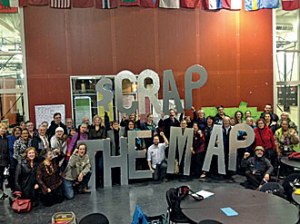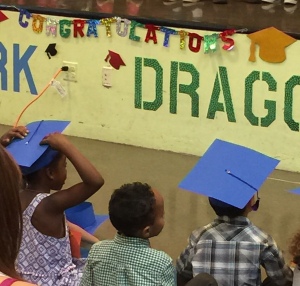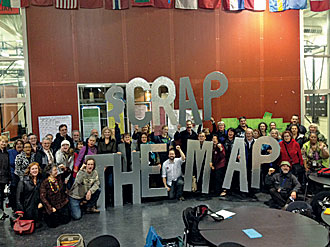 Last week the Seattle School District told my kindergarten son to take the Measures of Academic Progress (MAP) test.
Last week the Seattle School District told my kindergarten son to take the Measures of Academic Progress (MAP) test.
Given my intense relationship with this specific standardized test–an exam that has forever altered the course of my life–this was a particularly unsettling moment for me. As an authentic assessment activist, I had helped organize a boycott of this test at Seattle’s Garfield High School, I edited the book More Than a Score to tell the story of this movement against the MAP and the subsequent uprising against high-stakes testing, and I speak regularly around the country to share the lessons of the movement to “Scrap the MAP.”
I had long been committed to a fight for public education, but now it just got personal. Now they were trying confine my own boundlessly vibrant son into a test score bubble.

I had felt a great sense of accomplishment in our 2013 MAP test boycott, which resulted in a decisive victory when the superintendent ended the school year by announcing an end to the MAP test requirement for the high schools. Now, however, the announcement that it was MAP test week for my son felt a cruel irony. It was hard to have to face the fact that, despite how powerful our movement had become, we hadn’t defeated the test altogether and elementary school students were still being subjected to it.
The idea that our school system implements standardized testing in the early grades to make students “career and college ready” (in the language of the Common Core standards) is an utter absurdity–especially when you consider that one of the most popular career choices for a 5-year-old is being Spider Man. And yet high-stakes are attached to the the MAP test–already in kindergarten!–using it as an arbitrator of who will be placed on the advanced track. In schools around the nation, there is an astonishing proliferation of the use of standardized testing in the early grades, which is having a frightening impact our our children. Children are increasingly experiencing severe stress from these tests, to the point where administrators now have a protocol for what to do when a child throws up on a test booklet–something that comedian John Oliver highlighted on his program Last Week Tonight when he said, “Something is wrong with our system when we just assume a certain number of students will vomit.” As a recent report from Defending the Early Years points out kindergarten literacy standard will simply crush the spirits of the late bloomers, linking school with “feelings of inadequacy, anxiety, and confusion.”
The new Common Core standards, and the tests meant to measure student’s progress toward them of them, are dramatically developmentally inappropriate and punish the students for developing in different ways and at different rates. As Nancy Carlsson-Paige, professor emeritus of early-childhood education at Lesley University and a senior adviser for Defending the Early Years, wrote in the book, More Than a Score,
When the Common Core State Standards (CCSS) came out, many of us in early childhood were alarmed. There had not been one K-3 classroom teacher or early childhood professional on the committees that wrote and reviewed the CCSS. We could see that the standards conflicted with the research in cognitive science, neuroscience and child development that tell us what and how young children learn and how best to teach them. The pressure on young children to learn specific facts or skills increased, even though these expectations are unrealistic, inappropriate, and not based in research or principles of child development.
Moreover, young kids often struggle with the basic mechanics of answering questions on the new computer administered tests. As one Seattle elementary teacher wrote about Common Core testing this year,
Our school does not have a technology teacher and not all students have computer access at home, so many students have not learned computer or keyboarding skills. I watched more than one student hitting the space bar over and over because they did not know how to go down to the next line to start a new paragraph.
 These tests have led to drastic cuts in recess, arts, music, physical education, and other critical components to a robust education of the whole child–and this is especially true in schools the serve predominantly low income and students of color, as our education system has become singularly obsessed with “raising achievement.” Again, Professor Carlsson-Paige:
These tests have led to drastic cuts in recess, arts, music, physical education, and other critical components to a robust education of the whole child–and this is especially true in schools the serve predominantly low income and students of color, as our education system has become singularly obsessed with “raising achievement.” Again, Professor Carlsson-Paige:
Young children learn actively through hands-on experiences in the real world. They need to engage in active, playful learning, to explore and question and solve real problems. As children do this, they build concepts that create the foundation for later academic success. And perhaps even more importantly, through active, play-based, experiential learning, children develop a whole range of capabilities that will contribute to success in school and life: problem solving skills, thinking for themselves, using imagination, inventing new ideas, learning social, emotional, and self regulation skills. None of these capabilities can be tested but they are life-shaping attributes that are ready to develop in the early years.
And as the Harvard developmental psychologist Howard Gardner pointed out in a Boston Globe Globe article titled, “Is the Common Core Killing Kindergarten”, “Overuse of didactic instruction and testing cuts off children’s initiative, curiosity, and imagination, limiting their engagement in school.”
For these reasons, and due to the bitter struggle we waged during the 2013 boycott, the MAP test is practically a cuss word in my household. So when I asked my son if he wanted to take the MAP, it should be no surprise that he told me he was against taking it. He had obviously been paying close attention to this mass uprising against standardized testing, because he replied, “I take the tests my teachers makes, but not one that someone who doesn’t know me makes.”
With that, we wrote him an opt out letter, and my son joined the movement. Several other families opted their kids out of the test as well, and the parents took turns helping to provide alternative activities for the kids during the the test.
 My son was especially thrilled to go to school the day he was going to help teach a lesson to his fellow five and six-year-old dissidents during the opt out period. His idea for the lesson was for a parent to read a book to the students about Satchel Paige, the legendary Negro League pitcher, and then they would make baseball cards of their own, complete with the stats on the back. Miles brought the sports page in, as well, to help them with the stats and to show them how to read a box score. My son opened the lesson by telling everyone about the Negro Leagues, a league started by Black people when the Major Leagues wouldn’t let them play, and then the parent read the book. However, before they could get to the baseball card activity, the rest of the class returned from MAP testing early, unable to actually take the test because of a glitch in the computer program. His class had lost the morning of instruction.
My son was especially thrilled to go to school the day he was going to help teach a lesson to his fellow five and six-year-old dissidents during the opt out period. His idea for the lesson was for a parent to read a book to the students about Satchel Paige, the legendary Negro League pitcher, and then they would make baseball cards of their own, complete with the stats on the back. Miles brought the sports page in, as well, to help them with the stats and to show them how to read a box score. My son opened the lesson by telling everyone about the Negro Leagues, a league started by Black people when the Major Leagues wouldn’t let them play, and then the parent read the book. However, before they could get to the baseball card activity, the rest of the class returned from MAP testing early, unable to actually take the test because of a glitch in the computer program. His class had lost the morning of instruction.
 On the day the test was rescheduled, the students who opted out helped to make hats for the end of the year promotion ceremony to mark their passage to first grade. I asked my son what he thought of his experience opting out of the test. He said, “It was fun. I got to teach my friends about something, and we got to make our graduation hats…I didn’t have to worry if I was going to fail.”
On the day the test was rescheduled, the students who opted out helped to make hats for the end of the year promotion ceremony to mark their passage to first grade. I asked my son what he thought of his experience opting out of the test. He said, “It was fun. I got to teach my friends about something, and we got to make our graduation hats…I didn’t have to worry if I was going to fail.”
I can tell you kindergarteners never looked better in mortarboard caps then when they wore them at their joyous promotion ceremony this week. Maybe next time they will decorate them with the slogan, “Scrap the MAP!”?


Beautiful story , Jesse !!! Keep up this important work!
LikeLiked by 1 person
Happy to see an educator “Keep up the good work. putting his money where his mouth is”
LikeLiked by 1 person
Thank you Jesse for posting this first hand experience. I too ,as an educator in Seattle Public Schools, cringe when my Sped. students take theses tests that only cause more anxiety and frustration. I hope this movement continues to grow and support greater alternatives for out students.
LikeLiked by 1 person
Thank you Jesse for writing this important article- They are trying to strip our humanity away by these tests… Thank goodness some senators are fighting against ALL high stakes testing with this senate bill… They got a press release in several newspapers… http://www.shorelineareanews.com/
LikeLiked by 1 person
Dear Jesse,
Your post resonated with me in many ways. The opt out movement has always been personal to me as a teacher of young children, but when I, like you, was faced with opting my own children out it became (and will continue to be) a spiritual matter. I have been opting my children out of all standardized testing since 2009, including the MAP test. At the same time, as a 2nd grade teacher, I am forced to proctor this test for my young students. As a humanist, I believe in the infinite potential of all children. As a teacher, I see the destructive nature of this test. In my experience it promotes a skewed view of development and the resulting instructional methods that school districts, like mine, pursue are so harmful to children that I will never let my own children be participants in the process.
I soulfully know this struggle.
I want to share a letter I wrote to my son’s middle school counselor in hope that it might provide other parents with the words or ideas to continue this fight for their children. In the letter I wrote to my son’s future middle school counselor.
Dear Middle School Counselor,
I am writing about Zachary, an incoming 6th grader. He has many talents that are not traditionally honored in school. Up to this point we have worked hard to be partners to his teachers. Along with his teachers, we have tried to provide a supportive school environment where he has some opportunities to shine at school. This has helped maintain his emotional and intellectual investment in school.
Zachary is a fantastic performer. He loves to be viewed as knowledgeable and capable. He has had these opportunities in elementary school during PE, the school play and anytime he is asked to present information he is interested in. He feels great about himself and his learning when he is able to have these types of experiences.
Zachary is a fantastic language learner. When Zachary was in 3rd grade we moved to Rio de Janeiro, Brazil where he attended an American school for one school year. He very quickly picked up Portuguese through interactions with children. He has not had much opportunity to practice. I believe, with an excellent Spanish teacher, he will see his ability to learn languages as a gift he possesses. He also enjoys children who have experienced other cultures or who speak other languages. He would like to return to Brazil some day.
Zachary is highly motivated to learn about social justice issues that are occurring currently or have occurred in history. He loves learning about the civil rights movement but also enjoys discussing current events. He is quick to recognize social injustices that can occur in school and makes attempts (sometimes misguided but always pure of heart) to correct them. When he is misguided he is generally principled and takes responsibility for fixing his mistake. He really wants to understand the social issues going on around him.
Zachary is a hard worker. He will work hard to learn what is required of him. He will work the hardest in math but he will need support. He does not have a positive self image of himself as a mathematical thinker. We are working on praising the effort he puts into learning. He regularly asks his 5th grade teacher to stay after school for help. In our family we teach that education is a human right and if you don’t understand something you have a right to attain that knowledge. However, it can only be yours if you seek it out. A teacher who doesn’t know that you are confused can not help you. Zachary will not ask for help from an intimidating teacher.
Zachary is a deep processor. He needs time to think about things and his understanding of new concepts tends to develop over time. He needs many repetitions of new concepts before he can apply them independently. This is especially common in math. A common experience we have had with teachers who do not understand Zachary is that he will bring homework home from school that he does not understand because the concept was newly taught during class. This causes him a great deal of frustration and stress. In elementary school he has been very sensitive to how quickly other children understand a concept while he is still processing. We try to stress the importance and value of the hard work he puts in to understanding things and not the speed. Our fear in sharing this is that it will be misunderstood as a deficit or delay in Zachary’s development. This is not the case. Zachary is well within the normal limits of child development. He always has been.
Zachary is the victim of an over- standardized and over-academicized curriculum that has pressured him to achieve academic concepts that are not appropriate using methods that are not appropriate for him. He is also in a system that holds a standardized approach to assessment in high-esteem, often relegating Zachary to tracking, or grouping, techniques that would easily deflate his developing self-image and motivation. For this reason we have opted Zachary out of all standardized testing because we believe Zachary’s potential is limitless and cannot be condensed to a math and reading score. Any learning environment that stresses speed or quantity over quality will be a negative experience for Zachary.
Zachary lives a full life. He is busy after school with sports, friends and playing outside. Homework can be extremely stressful or overwhelming to him. I fear this could become a reason for Zachary to dis-invest in school. He does not view homework as contributing towards his learning. Homework has not helped Zachary to learn responsibility or study habits. It has caused significant tension in our family. Zachary needs teachers who understand that children his age need balance between home and school.
Zachary is extremely imaginative and a fantastic writer. He is a contextual learner so writing provides him with a rich opportunity to understand a topic and analyze it from whole to part. Since first grade he has become an expert in many topics because he wrote about them. He loves to write and read comics. Some freedom to choose topics is motivating for him. The same is true for any reading he is asked to do. A teacher who is overly fixated on handwriting, spelling ability or punctuation will not help him grow as a writer or a reader. A teacher with a broad definition of reading and writing who provides meaningful choices will positively impact his growth as a reader and a writer.
Zachary deserves time to learn and mature at the pace his mind and body determines. Despite the efforts of many adults to speed Zachary’s learning, he has developed at his own pace. He will be 12 in January. He will take time to mature and develop cognitively, but he always does. He can learn and there is nothing that impedes his learning except for his self-belief and his perceptions of the beliefs of those around him. He needs teachers who understand the development of children his age and have realistic expectations of them. He will get there in his own time. He just needs adults who convey their belief in him on a regular basis and especially when he is struggling to understand new concepts.
Thank you for taking the time to read about Zachary. We realize that educators are human beings and that there is no such thing as a perfect educational experience. We also know that Zachary, like all children, will struggle some but hopefully, with our support, will also find reasons to shine at school.
LikeLiked by 1 person
Thank you so much for sharing your letter with us! What a beautiful statement about your son–I hope you will save it and read it to him when he graduates. I also hope it will serve as a model for parents everywhere. I wonder if you mind if I repost this on the blog sometime soon?
Thanks so much!
LikeLike
Thank you for your encouraging response, Jesse. I have already shared my letter with Zachary because as early as kindergarten standardized tests impacted his school experience. Zachary, Joshua (his dad), and I have had many honest conversations about how he has gifts that could never be measured by a test or even, by much of the daily school work he has been asked to do. When I told him the story about your son and about your request to re-post my letter I was excited. I was also very cautious because I wanted to give him the option to protect his tender 11 year old identity. I should not have been surprised when he stated, emphatically, that he wanted his name included in the re-post. He was proud, as am I, to be included in your opt-out movement. We would proudly support the re-posting of Zachary’s important letter to his future middle school counselor and hope it might empower parents and students to be as brave as Zachary has been.
In appreciation and humility,
Kelly and Zachary
LikeLiked by 1 person
Dr. Kelly Pylkas-Bock,
I just wanted to let you know that I plan on running your statement on Monday. I could email you my introductory comments if you send me your email…my email is: jesse@rethinkingschools.org
sorry it took me a while to get organized to make this post, but I know a lot of parents will get a lot from it soon!
LikeLike
Sure, Jesse. I would love to read your introductory comments. After re-reading what I wrote I noticed a few errors. Is it appropriate for me to edit it a little or do you need to post it as-is? Either are fine. It is simply an honor to be included. My email is kpylkasbock@gmail.com. I will look forward to hearing from you!
Kelly
LikeLike
Thank you, Jesse.
Very well written.
Now Amplify is hitting Spokane and Seattle. Kindergartens will be taking the test in Spokane, and every grade after. MAP is gone… now replaced with Amplify.
~Raz
LikeLiked by 1 person
Reblogged this on **Little Saints** Academy, LLC.
LikeLike
Pingback: The Education of Zachary and the Soulful Struggle for “The Infinite Potential of All Children” | I AM AN EDUCATOR
MAP test is back again this year (Fall 2016). I’m a teacher at Madrona, my child attends Madrona and will not be taking the test. The rest of the students will lose a couple of days of ELA instruction for this useless computerized test.
LikeLike
Pingback: Why Kindergarten Assessments Hurt us All - kindermomma.com